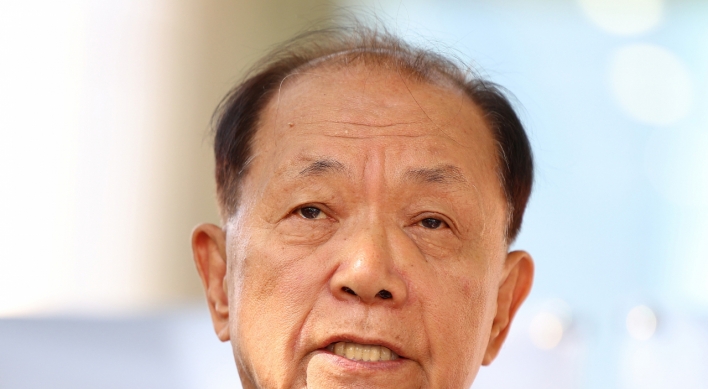[Kim Seong-kon] From Hallyu fans to Korean studies specialists
By Korea HeraldPublished : May 10, 2023 - 05:31

The other day, I passed by a Books-A-Million store near my house in rural New England. Otherwise known as “BAM!,” this big store is a typical pop culture emporium that sells books, DVDs, movies and toys. Normally I would walk by without a second thought, but I saw something that intrigued me, a big poster hanging on the front window that said, “K-Pop Available Here.” The poster got me so curious that I decided to drop in to see what they had.
Inside, I found another large signboard that said, “K-pop,” displayed over two bookshelves. There, I found a variety of DVDs of K-pop superstar groups such as BTS, Blackpink and others. I was struck by the fact that the bookshelves for K-pop occupied the best spot in the store, where everybody can spot them as soon as they walk in the door.
Then, I dropped into a nearby CVS, the famous American chain drugstore. There, I saw cookies, nuts and snacks that displayed the phrase, “Korean style.” After leaving the CVS, I went to a restaurant to have lunch at a place in the strip mall nearby. On the menu, I found a dish that came with kimchi, chicken with gochujang sauce and creamy Korean-style barbecue sauce. Finally, I entered the supermarket and bought a pack of Shin Ramyun, bibigo dumplings and galbi.
These days, Korean culture is literally everywhere I look. Netflix, too, has released a myriad of Korean movies and television dramas, which are very popular overseas. Last year, Apple TV+ produced a television series based on “Pachinko,” the epic novel by the Korean American writer, Min Jin Lee. The TV drama was nominated for an Emmy Award in 2022. Walt Disney, Paramount and SONY Pictures, too, are curious of the reasons why Korean films and TV dramas are so successful overseas these days.
Thanks to the popularity of Hallyu or the Korean Wave, South Korea has become a well-known country to students around the world. As a result, quite a few students outside Korea want to major in Korean studies. All of them are huge fans of K-pop or K-film, and they want to know more about Korean language, culture and history. The fact that South Korea is a country of cutting-edge technology represented by Samsung, LG and Hyundai also entices them to be interested in Korea.
Amidst this surge in Korea’s soft power which seems ubiquitous these days, it occurred to me that it would be much better if Hallyu accompanied Korea’s hard power, such as the systematic introduction of Korean culture, literature and history to Hallyu fans. In the case of America, many major universities have Korean studies programs.
One US university where American students can learn Korean studies comprehensively is George Washington University. Located near the White House and the State Department, GWU has been a major higher educational institution that nurtures future diplomats, government officials and global organization workers. It has an excellent Korean language, literature and culture program due to the strenuous efforts of Young-Key Kim-Renaud, professor emeritus of Korean Language and Culture and International Affairs.
The Institute for Korean Studies at the Elliott School of International Affairs, too, provided lectures and courses on Korean history and politics. Moreover, under the leadership of Shoko Hamano, professor of Japanese and International Affairs and chair of the Department of East Asian Languages and Literatures, the rapport among the faculty members of Korean, Japanese and Chinese studies is truly excellent.
When I taught at GWU, Ben Vinson III, then dean of the Columbian College of Arts and Sciences, strongly supported the Korean studies program, which was vital for the strength and expansion of the program. Vinson’s children, too, were huge fans of EXO at that time. Now, they must be ardent fans of BTS and Blackpink, as well. Vinson is now provost and executive vice president of Case Western Reserve University in Cleveland, Ohio.
Another excellent place for studying Korean studies is the University of California, Irvine. Chungmoo Choi, professor of East Asian studies, teaches Korean literature and Kyung Hyun Kim, professor of East Asian studies and visual studies, does Korean film. Victoria Jones, chief global affairs officer, has been particularly supportive for the Korean studies program, which greatly contributes to academic life at UC Irvine.
Dartmouth College’s Korean studies program, too, is superb. In the Asian Societies, Cultures and Languages Program, faculty members Soyoung Suh, Sunglim Kim and Sujin Eom teach Korean history, art history and architecture respectively, and assistant professor Miya Xie teaches Korean literature and culture. Associate professor of art history Allen Hockley, ASCL program chair, has been very supportive for promoting Korean studies at Dartmouth.
International students who major in Korean studies would like to visit South Korea for an internship or even their future career. We should welcome and appreciate them. We need not only Hallyu fans, but also specialists on and in Korea with whom we can work together. They will be invaluable assets for the future of South Korea.
When Hallyu is combined with Korean studies, the outcome is ideal. We will have more experts on Korea who will become our friends and support us when we need help in the future.
Kim Seong-kon
Kim Seong-kon is a professor emeritus of English at Seoul National University and a visiting scholar at Dartmouth College. The views expressed here are his own. -- Ed.
.
-
Articles by Korea Herald






![[KH Explains] No more 'Michael' at Kakao Games](http://res.heraldm.com/phpwas/restmb_idxmake.php?idx=644&simg=/content/image/2024/04/28/20240428050183_0.jpg&u=20240428180321)











![[Herald Interview] Mistakes turn into blessings in street performance, director says](http://res.heraldm.com/phpwas/restmb_idxmake.php?idx=652&simg=/content/image/2024/04/28/20240428050150_0.jpg&u=20240428174656)
